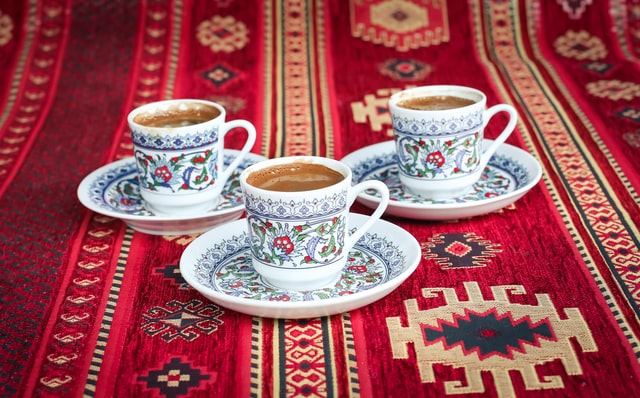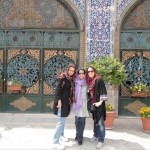How to Navigate Turkish Culture


Traveling and living in Turkey for four months requires you to eventually understand and accept Turkish culture for what it is: wonderful, fun and sometimes frustrating. Turks are known for their hospitality to their friends, family and strangers. Inviting someone in for cay (pronounced chai) is normal and it is drunk in tiny glass cups served with sugar. We may have grown up with the saying, don’t take candy from strangers, but in Turkey, it is a little bit different. Cay is more widespread than coffee and is a way of life here. For your safety, it is best if you politely refuse if you feel uncomfortable.
Your shoes and feet are considered dirty here, so PLEASE remove your shoes before you enter a home. There are many reasons for this, which include the influence of Islamic culture, which requires the ritual washing of the hands and feet before praying. Also, in Turkey, pit toilets–which are ubiquitous in restaurants, hotels, universities, museums, and police stations–require your feet to have contact with the toilet floor as the toilet is a manmade hole in the ground against which you squat.
In many touristy mosques such as the Sultan Ahmed Mosque, non-Muslims are not allowed to enter the mosque during the five daily prayer times.
Muslims also pray with their shoes off. When you enter a mosque, you will be required to remove your shoes before entering the prayer room out of respect and you will receive a plastic bag to put your shoes into. You can either leave them on a shelf inside the mosque or outside–or in a locker. In many touristy mosques such as the Sultan Ahmed Mosque, non-Muslims are not allowed to enter the mosque during the five daily prayer times.
Aside from taking your shoes off, be sure to cover your hair when entering a mosque. Many mosques provide them for you but it’s best to carry around your own scarf just in case. But if you forget your scarf or to take off your shoes, don’t worry. “No problem” is the national motto here. From shopkeepers to taxi drivers, “no problem” is one of the phrases you will hear. It’s usually a good thing as the people here desperately want your business so they’ll say it to agree to the price you’ve proposed, or the destination you’ve requested, or the resizing of a ring you’ve asked for at the bazaar.
“No problem” can also lead to problems though. For example, the ring that you want cannot actually be resized to fit your finger despite the jewelry seller’s attempts at pressing on the ring band–which is still too large for your finger. It can also mean that though the taxi driver says he knows where Bogazici University is, in reality he has no idea so you must demand that he pull over in the middle of the highway to find another cab.
This happened to my friends one night nobody in the taxi spoke Turkish and the taxi driver did not know word of English. Although Bogazici is a Turkish word for the Bosphorus a major waterway in Istanbul that straddles the European and Asian continents, the driver had no idea where the university was located though there are many signs for it on the highways.
Turkish people will tell you that they do not smoke but when they become drunk or stressed, they will light up.
Smoking cigarettes and sisha, hookah or nargilah–or whatever you call it–is very widespread here. Cigarettes are much cheaper here than in the United States and it is more widely accepted culturally though cigarette packages contain graphic images of lungs and slogans that say, “You will die a slow and painful death.” Turkish people will tell you that they do not smoke but when they become drunk or stressed, they will light up. But even if a Turk says she doesn’t smoke, she might still smoke sisha. Also, though smoking is now outlawed in restaurants and cafes–this is not always enforced. Beware of smelling like an ashtray after leaving a club or bar. At cafes in Istanbul, sisha is always accompanied by chai. It is very hard to find a place that serves sisha with alcohol.
Asking questions or for directions can be a frustrating process in Turkey especially in less touristy areas or cities–as I experienced this past weekend in Bursa, the former capital of the Ottoman Empire. Five people will tell you five different answers. This happens when asking where to purchase bus tickets, what documents we must bring to our residence permit appointments since we are studying here and in order to leave the country and come back we must have these permits, how to find a certain museum or anything else.
How to Navigate Turkish Culture.
My advice is to accept each suggestion nicely and if all else fails, ask more people. In the end, you will find what you were looking for even if it takes a while and causes you some stress. Signs are not posted that clearly or often in Turkey so it can be hard to find many places if you have no idea where they are located.
While living in Turkey, I have adjusted to the notion of Turkish time. Punctuality is non-existent for public transportation, meeting up with friends for dinner, getting helped in a store, or waiting for the police to finish their one-hour lunch break so they can process your application for your residence permit. But on the upside, time is very relaxed here, so people will not rush you and you will not be pushed around unless you are somewhere very crowded.
Food is served fast here though but you may have to wait for your menus to arrive after sitting down. Also you can choose where you want to sit. There are some instances in which you need to inform the waiter where you are sitting and ask for a menu. Since Turkish food is often greasy and oily (but ohh so delicious), you will be handed scented wipes that often smell lovely to clean your hands following your meal. Also, often the waiter will offer you cay for free or at the low price of one to two liras. While eating, expect to hear the phrase, “Afiyet Olsun” (Have a good meal).
While waiting in line, don’t stand too far apart from the person in front of you or someone might want to move into that spot.
Turks in general are helpful and friendly. In Turkey, it is common for men and younger people to give up their seats to women and the elderly on public transportation.
Finally, the concepts of lines and waiting are almost non-existent in public places unless the lines are organized in some way. It is very normal for people to budge in line to get onto a bus if it is especially crowded, and to get into a club. While waiting in line, don’t stand too far apart from the person in front of you or someone might want to move into that spot.
Pedestrians do not have the right of way here and there are very few crosswalks. Cars will literally stop inches away from you and will even beep their horn while you cross the street. A safety tip for pedestrians is always to walk in a crosswalk. Make sure to look both ways and never trust drivers here. There have been many times when I was almost hit by a car so look out for cars and buses. Safe travels!
How to Navigate Turkish Culture photo by Unsplash.









Hello, as a single woman who would like to apply for Residence Permit on her first trip to Turkey, would it be completely safe and all right navigating around even though I have no friends and no command of the Turkish language?